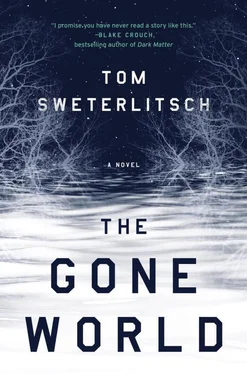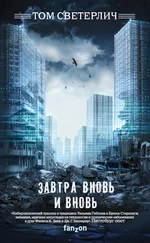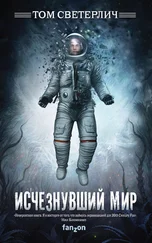Том Светерлич - The Gone World
Здесь есть возможность читать онлайн «Том Светерлич - The Gone World» весь текст электронной книги совершенно бесплатно (целиком полную версию без сокращений). В некоторых случаях можно слушать аудио, скачать через торрент в формате fb2 и присутствует краткое содержание. Город: New York, Год выпуска: 2018, ISBN: 2018, Издательство: G. P. Putnam's Sons, Жанр: Детективная фантастика, Триллер, на английском языке. Описание произведения, (предисловие) а так же отзывы посетителей доступны на портале библиотеки ЛибКат.
- Название:The Gone World
- Автор:
- Издательство:G. P. Putnam's Sons
- Жанр:
- Год:2018
- Город:New York
- ISBN:978-0-39916-750-8
- Рейтинг книги:5 / 5. Голосов: 1
-
Избранное:Добавить в избранное
- Отзывы:
-
Ваша оценка:
- 100
- 1
- 2
- 3
- 4
- 5
The Gone World: краткое содержание, описание и аннотация
Предлагаем к чтению аннотацию, описание, краткое содержание или предисловие (зависит от того, что написал сам автор книги «The Gone World»). Если вы не нашли необходимую информацию о книге — напишите в комментариях, мы постараемся отыскать её.
The Gone World — читать онлайн бесплатно полную книгу (весь текст) целиком
Ниже представлен текст книги, разбитый по страницам. Система сохранения места последней прочитанной страницы, позволяет с удобством читать онлайн бесплатно книгу «The Gone World», без необходимости каждый раз заново искать на чём Вы остановились. Поставьте закладку, и сможете в любой момент перейти на страницу, на которой закончили чтение.
Интервал:
Закладка:
“But you are real where I come from. You’ll still live this life,” I said.
“Dr. Wally Njoku might be real, he might meet Jayla in a few weeks, like you said, he might even have a family, but he won’t have the same family. What are the odds of one particular spermatozoon fertilizing one particular egg? Njoku might have children, but they won’t be the same children, they won’t be mine. He’ll be happy, but it won’t be my happiness—”
“I know,” I told him. “I understand, I do.”
“But I came to accept that my existence is an illusion. Have you ever seen a flower called the ‘falling star’ as it blooms?” he asked. “I saw one—this was several years ago, in summer. I was taking a walk with Jayla when we passed a neighbor’s garden and noticed a certain flower in early bloom. She pointed it out to me, and I was transfixed. A single stem, every bud perfectly symmetrical—the color was orange, almost like fire. I was struck because the first two buds to bloom, at the base of the stem, were in full flower, but the next two buds up the line had only just begun to bloom, the next two buds were smaller still, and so on, all the way up to the tip of the stem, where the flowers were merely two closed buds that had yet to open at all. This was the Crocosmia , the ‘Lucifer,’ but Jayla knew it as the falling star. I understand that we physicists interpret existences as something like a symptom of wave-function collapse, some quantum illusion to exploit, a brief fermata of indeterminacy, but I prefer to think of myself and all my selves as the falling star, every permutation of every choice I’ve ever made and ever will make existing in every moment, forever. ‘Merrily, merrily’—isn’t that what the truest sailors say? Nothing blinks out, nothing ends. Everything exists, always exists. Life is but a dream, Shannon. Self is the only illusion.”
Ileft Oceana the following morning, in the car that had been requisitioned for me, a beige sedan. I drove from Naval Air Station Oceana north through D.C. to pick up the Pennsylvania Turnpike West, thinking of the falling star. My car was electric, battery-powered, the engine silent, a constant worry that I had slipped into neutral and was coasting. Caffeine helped me overcome the sensation of being caught in a waking dream—I ordered a black coffee at a Starbucks near an outlet mall in Fredericksburg. Country music on the radio, songs I’d never heard before and might not ever hear again, but once the mountains turned FM into static, I scanned AM until I found a minister speaking about the Resurrection. Do you believe in the resurrection of the body?— something Nestor had asked me. Through the Allegheny Mountain Tunnel. Isolated houses, tobacco barns fallen into ruin. I watched hawks circle above conical saltcellars. What had this drive been like the last time I’d made it—less than a year ago in my world, but almost twenty years ago in this one? What had the scenery been? Trying to figure out what was new, what was lost. Yards full of junk and houses lined with rusted scaffolding. Communications towers, a white church in a valley near Breezewood. Newer service plazas, motion-sensor toilets that flushed by themselves. I had to charge my engine by plugging in. The changes of the intervening years registered more acutely as I neared Canonsburg—industrial parks and gleaming office cubes and sprouts of housing developments in what had once been only vacant green hills. The hills were cluttered with white windmills, lazily spinning, and I saw entire fields of solar panels where there had once been crops. Driving into Canonsburg still felt like coming home. The drive downhill on Morganza was the same, as was the Pizza Hut that edged Chartiers Creek.
I checked with the Canonsburg Police Department and found my mom still alive, her address listed as Room 405 at Townville Health and Rehabilitation. Up the hill on Barr, already dusk when I pulled in to the lot. Women in wheelchairs taking in the evening air, old men smoking. Jeopardy! in the rec room, a hand of euchre—I scanned the card players, nervous to see her, wondering how much she’d changed. An elevator to the fourth floor, framed paintings of cottages, flora. Mom often said she never wanted to end up in a place like this, said I should kill her before I let that happen.
The door to 405 was open, the television blaring. The room was sterile in the way of doctors’ offices, the color scheme nothing that would have been chosen for a home—blue and fuchsia with white-flowered wallpaper. A food tray was swiveled over the bed, plastic dishes and a carton of milk, the same sort kindergartners would drink from. Potted hyacinths were on the nightstand, filling the room with sweetness that masked the earthier smells of my mother’s body.
“I think my dosage is off,” she said. “I’ve been drowsy—”
I flinched at the concavities of her face when she turned toward me. The shape of my mother’s head was different, tucked in; a significant part of her jaw had been removed. She looked mummylike, bandage-wrapped bedsores on her forearms and bedsheets over her legs.
“Mom,” I said.
“Oh?” she said. “Oh, I thought you were the nurse. Shannon?”
“It’s me, Mom.”
“It can’t be. I don’t believe you.”
Mom propped herself up on her elbows, her gown falling away to reveal the skin of her shoulders, even more supple with age, softer, it seemed, and coated with white down. Her hair was mussed—it looked greasy, like it hadn’t been washed in several days.
“You haven’t changed a day,” she said. “Look at you, Shannon. Where have you been? You left me. You left me bereft. You left me alone.”
“I was deployed,” I said, a lie made no less vile because it was in some sense true. “I had to go.”
“I’m… look at me,” she said, tugging her gown back over her shoulders. “I’m so embarrassed. You shouldn’t see me like this. You shouldn’t see your own mother like this. You should have told them you were coming, I could have dressed.”
Her expressions were altered because of her surgeries, scars like white worms wriggled on her jowls and throat when she talked. I said, “Mom, it’s all right, I like seeing you.”
“New nurses come in here every day, and they don’t take care of me. Sweetie? Sweetie, are you out there? Come here, Sweetie—”
“I’m here,” I said, but when I took a step closer to the bed, Mother said, “Not you.”
A woman appeared in the doorway, a hoary woman in a wheelchair, her hair a tangle of steel wool. Sweetie pulled herself along with her white sneakers and her hands on the wheels, tucked herself inside the room and stared at me.
“This is the one I told you about, Sweetie,” said Mom. “The daughter.”
“I’m Shannon,” I said, realizing I’d been damned during my years of absence. “A pleasure to meet you.”
Sweetie laughed, a horrible wheezing.
“Sweetie’s my friend, my only friend,” said Mother. “We call this place our ghost house, because we feel like ghosts here.”
“Sure enough,” said Sweetie.
I pulled a chair over to my mother’s bedside, took one of her hands. She was insubstantial, just bones and veins and a wrapping paper of skin.
“What happened?” I asked. “You’ve been sick.”
“I’m told I’m a tough old bird, Shannon,” she said. “Too gamy for death to eat.”
Cancer in her intestines and in her mouth, she explained. The doctors broke her jaw and removed the cancerous half. They cut apart her throat. Cut open her intestines and clipped out the effected lengths, leaving her with a colostomy bag.
“All I ate was Ensure,” she said. “Seemed like years. I had a feeding tube right in my stomach for such a long time, right here,” she said, pointing just above her belly button. “I turned skinny.”
Читать дальшеИнтервал:
Закладка:
Похожие книги на «The Gone World»
Представляем Вашему вниманию похожие книги на «The Gone World» списком для выбора. Мы отобрали схожую по названию и смыслу литературу в надежде предоставить читателям больше вариантов отыскать новые, интересные, ещё непрочитанные произведения.
Обсуждение, отзывы о книге «The Gone World» и просто собственные мнения читателей. Оставьте ваши комментарии, напишите, что Вы думаете о произведении, его смысле или главных героях. Укажите что конкретно понравилось, а что нет, и почему Вы так считаете.




![Том Светерлич - Завтра вновь и вновь [litres]](/books/401288/tom-sveterlich-zavtra-vnov-i-vnov-litres-thumb.webp)
![Том Светерлич - Исчезнувший мир [litres]](/books/420722/tom-sveterlich-ischeznuvshij-mir-litres-thumb.webp)






